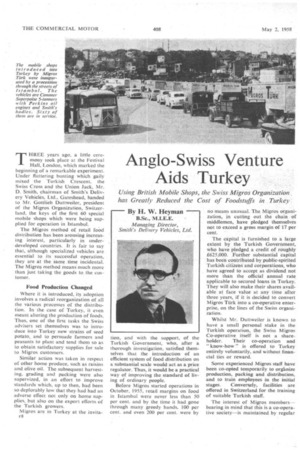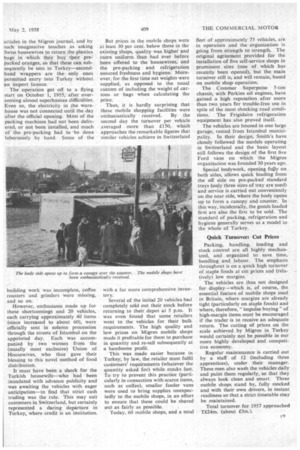Anglo-Swiss Venture Aids Turkey
Page 96

Page 97

If you've noticed an error in this article please click here to report it so we can fix it.
Using British Mobile Shops, the Swiss Migros Organization has Greatly Reduced the Cost of Foodstuffs in Turkey
THREE years ago, a little ceremony took place at the Festival Hall, London, which marked the beginning of a remarkable experiment. Under fluttering bunting which gaily mixed the Turkish Crescent. the Swiss Cross and the Union Jack, Mr. D. Smith. chairman of Smith's Delivery Vehicles, Ltd., Gateshead, handed to Mr. Gottlieb Duttweiler, president of the Migros Organization. Switzerland, the keys of the first 60 special mobile shops which were being sup
plied for operation in Istambul. .
The Migros method of retail food distribution has been arousing increasing interest, particularly in underdeveloped countries. It is fair to say that, although specialized vehicles are essential to its successful operation, they are at the same time incidental. The Migros method means much more than just taking the goods to the customer.
Food Production Changed
Where it is introduced, its adoption involves a radical reorganization of all the various processes of the distribution. In the case of Turkey, it even meant altering the production of foods. Thus, one of the first tasks the Swiss advisers set themselves was to introduce into Turkey new strains of seed potato, and to persuade farmers and peasants to plant and tend them so as to obtain satisfactory supplies for sale to Migros customers.
Similar action was taken in respect of other home produce, such as raisins and olive oil. The subsequent harvesting, grading and packing were also supervized, in an effort to improve standards which, up to then, had been so deplorably low that they had had an adverse effect not only on home supplies, but also on the export efforts of the Turkish growers.
Migros are in Turkey at the invitar8 tion. and with the support, of the Turkish Government, who, after a thorough investigation, satisfied themselves that the introduction of an efficient system of food distribution on a substantial scale would act as a price regulator. Thus, it would be a practical way of improving the standard of living of ordinary people.
Before Migros started operations in October, 1955, retail margins on food in Istambul were never less than 50 per cent. and by the time it had gone through many greedy hands. 100 per cent. and even 200 per cent. were by no means unusual. The Migros organization, in cutting out the chain of middlemen, have pledged themselves not to exceed a gross margin of 17 per cent.
The capital is furnished to a large extent by the Turkish Government, who have pledged a credit of roughly .£625,000. Further substantial capital has been contributed by public-spirited Turkish citizens and corporations, who have agreed to accept as dividend not more than the official annual rate applicable to secured loans in Turkey. They will also make their shares available at face value at any time after three years, if it is decided to convert Migros Turk into a co-operative enterprise, on the lines of the Swiss organization.
Whilst Mr. Duttweiler is known to have a small personal stake in the Turkish operation, the Swiss Migros Co-operative itself is not a shareholder. Their co-operation and "know-how" is offered to Turkey entirely voluntarily, and without financial ties or reward.
Some experienced Migros staff have been co-opted temporarily to org'anize production, packing and distribution, and to train employees in the initial stages. Conversely, facilities are offered in Switzerland for the training of suitable Turkish staff.
The interest of Migros members— bearing in mind that this is a co-operative society—is maintained by regular
articles in the Migros journal, and by such imaginative touches as asking Swiss housewives to return the plastics bags in which they buy ttteir prepacked oranges, so that these can subsequently be sent to Turkey—secondhand wrappers are the only ones permitted entry into Turkey without an import licence.
The operation got off to a flying start on October 1, 1955, after overcoming almost superhuman difficulties. Even so, the electricity in ,the warehouse was not connected until the day after the official opening. Most of the packing machines had not been delivered, or not been installed, and much of the pre-packing had to be done laboriously by hand. Some of the building work was incomplete, coffee roasters and grinders were missing, and so on.
However, enthusiasm made up for these shortcomings and 20 vehicles, each carrying approximately 40 items (since increased to about 60), were officially sent in solemn procession through the streets of Istambul on the appointed day. Each was accompanied by two women from the (usually most exclusive) Union of Housewives, who thus gave their blessing to this novel method of food distribution.
It must have been a shock for the Turkish housewife—who had been inundated with advance publicity and was awaiting the vehicles with eager anticipation—to find that strict cash trading was the rule. This may suit customers in Switzerland, but certainly represented a daring departure in Turkey, where credit is an institution. But prices in the mobile shops were at least 30 per cent. below those in the existing shops, quality was higher and more uniform than had ever before been offered to the housewives, and the pre-packing and refrigeration ensured freshness and hygiene. Moreover, for the first time net weights were supplied, as opposed to the usual custom of including the weight of cartons or bags when calculating the price.
Thus, it is hardly surprising that these mobile shopping facilities were enthusiastically received. By the second day the turnover per vehicle averaged more than £150,which approaches the remarkable figures that similar vehicles achieve in Switzerland with a far more comprehensive inventory.
Several of the initial 20 vehicles had completely sold out their stock before returning to their depot at 5 p.m. It was even found that some retailers went to the vehicles for their bulk requirements. The high quality and low prices on Migros mobile shops made it profitable for them to purchase in quantity and re-sell subsequently at a handsome profit.
This was made easier because in Turkey, by law, the retailer must fulfil customers' requirements (whatever the quantity asked for) while stocks last. To try to prevent this practice (particularly in connection with scarce items, such as coffee), smaller feeder vans were used to bring supplies unexpectedly to the mobile shops, in an effort to ensure that these could be shared out as fairly as possible.
Today, 60 mobile shops, and a total fleet of approximately 75 vehicles, are in operation and the organization is going from strength to strength. The original agreement provided for the installation of five self-service shops in prominent sites (one of which has recently been opened), but the main turnover still is, and will remain, based on mobile shop operation.
The Commer Superpoise 5-ton chassis, with Perkins oil engines, have gained a high reputation after more than two years for trouble-free use in spite of the most shocking road conditions. The Frigidaire refrigeration equipment has also proved itself.
The vehicles are housed in one large garage, rented from Istambul municipality. In their design, Smith's have closely followed the models operating in Switzerland and the basic layout still follows the design of the first five Ford vans on which the Migros organization was founded 30 years ago.
Special bodywork, opening fully on both sides, allows quick loading from the off side on pre-packed standard trays (only three sizes of tray are used) and service is carried out conveniently on the near side, where the body opens up to form a canopy and counter. In this way, incidentally, the goods loaded first are also the first to be sold. The standard of packing, refrigeration and hygiene generally serves as a model to the whole of Turkey.
Quick Turnover: Cut Prices
Packing, handling, loading and stock control are all highly mechanized, and organized to save time, handling and labour. The emphasis throughout is on a quick high turnover of staple foods at cut prices and (relatively) low margins.
The vehicles are thus not designed for display—which is, of course, the essential feature of mobile shops used in Britain, where margins are already tight (particularly on staple foods) and where, therefore, "impulse buying " of high-margin items must be encouraged if the trader is to receive an adequate return. The cutting of prices on the scale achieved by Migros in Turkey would certainly not be possible in our more highly developed and competitive economy.
Regular maintenance is carried out by a staff of 12 (including three apprentices), under their manager. These men also wash the vehicles daily and paint them regularly, so that they always look clean and smart. Three mobile shops stand by, fully stocked and with their own drivers, in instant readiness so that a strict timetable may be maintained.
Total turnover for 1957 approached T£24m. (about £3m.).




















































































































































































































































